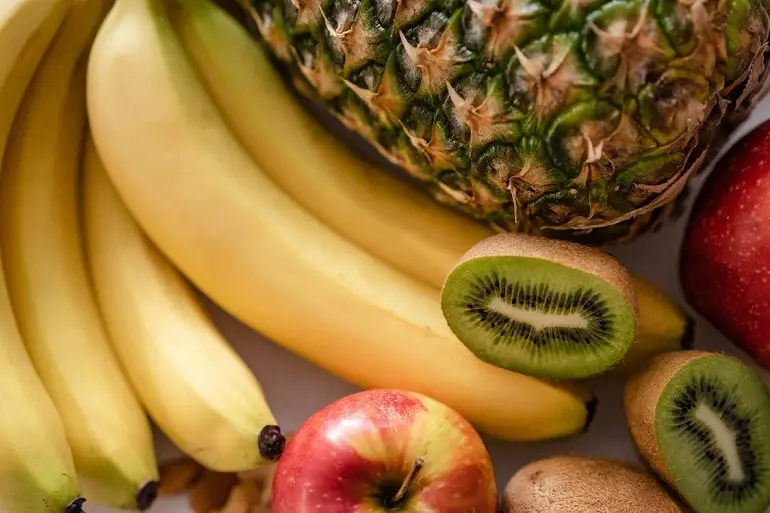Somatropin, also known as growth hormone, is produced by somatotropic cells within the pituitary gland.
Its primary role is to encourage the growth of bones, muscles, and organs, while also promoting cellular reproduction and renewal.
Furthermore, HGH plays a crucial role in enhancing the metabolic system. It facilitates metabolic processes, converting food into energy, and waste products.
Additionally, HGH aids in molecule transportation, sugar regulation, protein synthesis, and fat metabolism.
By contributing to adequate bone density, heart muscle function, and blood glucose levels, HGH also helps reduce the risk of certain health conditions like high cholesterol and osteoporosis.
While children have elevated levels of this hormone to support growth, it diminishes with age.
In this article, we unveil foods that can naturally stimulate human growth hormone (HGH).
What Foods Increase HGH?
Certain foods are renowned for their ability to enhance the secretion of growth hormone.
Zinc-rich foods are particularly crucial for preventing hormonal deficiencies, as this trace element plays a key role in enzyme production, which in turn stimulates the production of growth hormone.
While zinc is abundant in animal products like meat and seafood, it’s also found in significant amounts in pumpkin seeds, oats, and legumes.
Magnesium is another essential nutrient for growth hormone secretion, as it aids in muscle relaxation and promotes sleep. Seaweed is recommended as a rich source of this mineral, with a small handful every two days being beneficial. Nuts, bananas, fish, and dark chocolate are also rich sources of magnesium.

Vitamin B6 is crucial for the proper functioning of zinc and magnesium in their respective roles. It can be found in meat, fish, seafood, nuts, bananas, and prunes.
Natural stimulation of growth hormone relies on testosterone production, which is synthesized from cholesterol.
Contrary to common assumptions, as we age, our need for cholesterol increases. Elevated blood cholesterol levels are a result of the body’s efforts to repair damaged tissues. Lowering cholesterol levels can impede tissue repair and accelerate aging.
Amino acids play a vital role in stimulating growth hormone production and are present in animal products.
Bone broth and chicken broth, in particular, are highly recommended for individuals experiencing hormonal deficiencies, sleep issues, blood sugar imbalances, and irritable bowel problems.
The Significance of Glycemic Load in Stimulating Growth Hormone
The significance of glycemic load in stimulating growth hormone lies in its impact on hormonal balance and overall health.
Glycemic load refers to the quantity and quality of carbohydrates in a food item and how they affect blood sugar levels.
Foods with a high glycemic load cause a rapid spike in blood sugar, leading to an insulin response that can suppress growth hormone secretion.
When blood sugar levels rise sharply, insulin is released to facilitate glucose uptake into cells, which can inhibit growth hormone release. Growth hormone plays a vital role in tissue repair, metabolism, and overall growth, so maintaining optimal levels is essential for health and vitality.
Consuming foods with a lower glycemic load, such as whole grains, fruits, vegetables, and lean proteins, can help stabilize blood sugar levels and support healthy growth hormone secretion.
By avoiding high-glycemic foods like sugary snacks, processed carbohydrates, and sweetened beverages, individuals can optimize their hormonal balance and promote overall well-being.
What Factors Influence Growth Hormone Secretion?
Experts recommend prioritizing early bedtime around 10 p.m. as it aligns with optimal release of the sleep hormone, promoting tissue repair, digestion, and detoxification.
Regular physical activity supports tissue oxygenation and hormone production.
Derivative baths are advocated by nutritionists to enhance hormone levels, bolster immunity, activate antioxidant enzymes, and eliminate toxins. This involves heating the bathroom, alternating ice water over the left and right groins, and finishing with a cold shower.
However, direct intake of growth hormone is discouraged due to its stimulation of insulin-like growth factor-1 (IGF1), which mirrors insulin’s functions.
Excessive IGF1 intake can lead to inflammation, excess growth hormone, and heightened risk of cancer and diabetes.
11 Growth Hormone Foods
Human Growth Hormone (HGH) is a peptide hormone vital for stimulating growth, cell production, and regeneration in humans. While growth stimulation is its primary function, HGH also serves various other roles in the body.
As we age, the natural decline in growth hormone levels can impact various organs and bodily functions.
To maintain optimal growth hormone levels, consuming foods known to promote growth hormone secretion is beneficial.
Here are the top 11 foods known to boost growth hormone production:
Seafood
Seafood can have a positive impact on HGH production due to its rich content of essential nutrients such as zinc, magnesium, and vitamin B6. These nutrients are known to stimulate the secretion of growth hormone in the body.
Shellfish like oysters, crab, and shrimp, are excellent sources of zinc. Zinc is essential for the production of enzymes that play a role in generating growth hormone. Adequate zinc intake can help support optimal growth hormone levels in the body.

Fish, especially fatty fish like salmon and mackerel, are high in magnesium. Magnesium is important for various physiological processes, including the secretion of growth hormone. Consuming seafood rich in magnesium can contribute to enhanced growth hormone production.
Seafood contains vitamin B6, which is involved in the metabolism of amino acids and the synthesis of neurotransmitters. Vitamin B6 plays a role in the proper functioning of the pituitary gland, which is responsible for releasing growth hormone. Including seafood in the diet can provide vitamin B6 necessary for optimal growth hormone secretion.
Lean protein sources
Meat can have a significant impact on growth hormone secretion due to their amino acid content and their role in muscle synthesis and repair.
Lean protein sources such as poultry, lean beef, fish, eggs, and dairy products contain essential amino acids that are necessary for the synthesis of proteins, including growth hormone.

Amino acids serve as building blocks for protein synthesis, which is essential for muscle growth and repair. Certain amino acids, such as arginine, ornithine, and lysine, have been shown to stimulate the release of growth hormone when consumed in adequate amounts.
Lean protein sources provide the body with the necessary nutrients to support muscle synthesis and repair. When you consume lean protein, your body breaks it down into amino acids, which are then used to build and repair muscle tissue. This process requires the secretion of growth hormone, which plays a crucial role in muscle growth and recovery.
Lean protein sources also indirectly influence growth hormone secretion by stimulating the production of insulin-like growth factor 1 (IGF-1). IGF-1 is a hormone that is structurally similar to insulin and plays a key role in cell growth, proliferation, and differentiation.
It is produced in response to growth hormone stimulation and works in concert with growth hormone to promote tissue growth and repair.
Dairy products
Dairy products can impact growth hormone production due to their nutrient content, particularly protein and certain bioactive compounds.
Products such as milk, cheese, and yogurt are rich sources of protein, which is essential for muscle growth and repair. Consuming dairy products provides the body with the necessary building blocks for muscle tissue repair and growth, which can indirectly support growth hormone production.

Whey protein, a component of dairy products, has been shown to stimulate the release of growth hormone when consumed as a supplement. Whey protein contains high levels of branched-chain amino acids (BCAAs), particularly leucine, which are known to stimulate protein synthesis and growth hormone secretion, particularly when consumed post-exercise.
Dairy products contain bioactive compounds such as peptides and growth factors that may influence growth hormone production.
For example, bioactive peptides derived from milk proteins have been shown to have growth-promoting effects and may stimulate growth hormone secretion.
Additionally, dairy products contain small amounts of insulin-like growth factor 1 (IGF-1), a hormone that is structurally similar to insulin and plays a role in cell growth and proliferation.
Berries
Strawberries, blueberries, raspberries, and blackberries, are rich in antioxidants, vitamins, and minerals, which can have a positive impact on growth hormone production.
Berries are known for their high antioxidant content, particularly flavonoids and polyphenols. Antioxidants help protect cells from oxidative stress and may enhance growth hormone secretion.
Chronic inflammation has been associated with reduced growth hormone levels. Berries contain anti-inflammatory compounds that can help reduce inflammation in the body.
Some berries, such as strawberries, contain compounds that promote the production of nitric oxide in the body.
Nitric oxide is a vasodilator that helps relax blood vessels and improve blood flow. Enhanced blood flow may support the delivery of nutrients and hormones, including growth hormone, to target tissues and organs.
Watermelon
Watermelon is rich in the amino acid L-citrulline, which is converted into another amino acid called L-arginine in the body. L-arginine plays a role in stimulating the release of growth hormone from the pituitary gland.
Besides, watermelon has a high water content, making it an excellent hydrating food. Proper hydration is essential for optimal physiological function, including hormone production and secretion. Staying hydrated may help support overall health and metabolic processes, which can indirectly influence hormone levels.
Bananas
This fruit contain vitamin B6, which is involved in various metabolic processes, including the synthesis of neurotransmitters and amino acids. Adequate levels of vitamin B6 are necessary for the proper functioning of enzymes involved in amino acid metabolism, which affect HGH production.
Bananas contain small amounts of the amino acid tryptophan, which is a precursor to serotonin, a neurotransmitter involved in mood regulation and sleep. Adequate serotonin levels may support healthy sleep patterns, and getting enough quality sleep is important for optimal HGH secretion, as most HGH is released during deep sleep stages.

Banana is also a source of carbohydrates, primarily in the form of natural sugars such as glucose, fructose, and sucrose. Consuming carbohydrates, especially in combination with protein, can stimulate the release of insulin, which may have indirect effects on HGH secretion.
Insulin and HGH have a complex relationship, and insulin-like growth factor 1 (IGF-1), which is partially regulated by insulin, can influence HGH levels.
Pineapple
This tropical fruit known for its sweet taste has numerous health benefits. Pineapple contains bromelain, a mixture of enzymes known for its anti-inflammatory and digestive properties. Bromelain may help support digestion and nutrient absorption, which are important factors for overall health and hormone regulation.
Pineapple is rich in antioxidants and various phytochemicals. Antioxidants help neutralize free radicals and reduce oxidative stress, which can support cellular health and potentially influence hormone production and signaling pathways.
Pineapple provides essential vitamins and minerals that are important for overall health and metabolic function. These nutrients support optimal hormone production and regulation by promoting proper cellular function and metabolism.
Spinach
Leafy green vegetables packed with essential vitamins, minerals, and antioxidants, including vitamin C, vitamin K, folate, iron, and magnesium.
Spinach is a good source of iron, an essential mineral involved in oxygen transport, energy metabolism, and red blood cell production.

It contains magnesium, a mineral that is involved in hundreds of biochemical reactions in the body, including energy metabolism, muscle function, and nerve transmission. Adequate magnesium intake may support optimal hormone balance and metabolic function.
Spinach contains compounds known as phytoecdysteroids, which are plant-based steroids that have been studied for their potential effects on muscle growth and performance.
While more research is needed to understand their mechanisms of action and their impact on hormone levels, some studies suggest that phytoecdysteroids may have anabolic properties that could indirectly influence HGH production.
Almonds
They are a good source of plant-based protein, containing all nine essential amino acids needed for protein synthesis.
Almonds are rich in monounsaturated fats, particularly oleic acid, which is beneficial for heart health and may help regulate cholesterol levels. Healthy fats are essential for hormone synthesis and function, as hormones are made from cholesterol and require fats for transport and signaling.
Almonds are also a good source of magnesium, which is one of the important players in growth hormone production.
Legumes
Legumes are excellent plant-based sources of protein, containing a combination of essential amino acids needed for protein synthesis. Adequate protein intake is essential for muscle repair, growth, and overall metabolic function, which can support optimal growth hormone production and secretion.
They are high in dietary fiber, including both soluble and insoluble fibers, which support digestive health, blood sugar regulation, and satiety.
Legumes have a relatively low glycemic index (GI), meaning they cause a gradual and steady increase in blood sugar levels. Consuming low-GI foods helps maintain stable blood sugar levels and may indirectly support optimal hormone production and secretion.
Legumes are rich in various vitamins and minerals, including folate, magnesium, potassium, and iron, which play essential roles in energy metabolism, muscle function, and overall health.
Dark Chocolate
Chocolate is a good source of magnesium, an essential mineral involved in hormone regulation.
Flavanols found in dark chocolate have been shown to improve endothelial function and promote vasodilation, leading to increased blood flow and improved circulation. Enhanced blood flow may support nutrient delivery and hormone signaling throughout the body.

Dark chocolate contains compounds such as phenylethylamine (PEA) and serotonin precursors, which can have mood-enhancing effects.
It has a relatively low glycemic index (GI), and consuming low-GI foods helps maintain stable blood sugar levels and supports optimal hormone secretion.
Opt for dark chocolate with a high cocoa content (70% or higher) and minimal added sugars and unhealthy fats.
Conclusion
Incorporating certain foods into your diet may help support the natural production of human growth hormone (HGH).
Foods rich in nutrients such as protein, magnesium, zinc, antioxidants, and low-glycemic carbohydrates can positively influence hormone balance and metabolic function.
Seafood, lean protein sources, dairy products, berries, pineapple, watermelon, bananas, spinach, almonds, legumes, and dark chocolate are among the foods that may promote HGH production.
Moreover, supplements like GenF20 Plus can further enhance your growth hormone synthesis. It functions as a hormone booster, harnessing the power of vitamins and amino acids to foster a natural hormonal environment within the body.
Serving as a comprehensive supplement, GenF20 Plus not only boosts growth hormone levels but also supports various physiological processes.
Crafted in a cGMP-certified manufacturing facility, the formula adheres to stringent quality standards prevalent in the industry, ensuring product excellence.
In the end, just a short note – individual responses to dietary factors may vary, so it’s advisable to consult with a healthcare professional for personalized nutrition recommendations.
